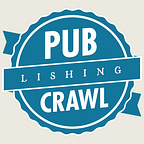This week JJ and Kelly tackle another writing topic: POV, or Point of View. APOLOGIES FOR THE DELAY, everyone! The week this episode was supposed to go up was release week for JJ, so she had no time to edit or put up show notes. Still, better late than never, right?
Show Notes
POV, or Point of View, is the perspective in which a story is told.
In modern writing, we generally tell stories from 2.5 perspectives: first person and third person limited/third person omniscient.
First person
Commonly found in young adult these days
Is more emotionally intimate/immediate than third person
Is a bit more narrow or limited in scope (i.e. does not extend beyond the protagonist's thoughts or experiences); this does not mean the narrative is limited or narrow in scope, just that the reader knows only what the protagonist knows.
The closeness and subjectivity of this POV can allow for an unreliable narrator (i.e. the protagonist withholds information from the reader or is continually changing their story).
It is easiest to achieve a distinct "voice" in the first person; however, it can also be used as a crutch.
First person past vs. first person present
First person past is pretty simple, e.g. "I walked to my car."
First person present is "I walk to my car."
Most first person is in past tense, but be careful if you choose to write in first person present tense.
Present tense adds a layer of urgency to an already intimate POV, and can be used to great effect in books where action is very tense (e.g. The Hunger Games).
Third person limited
Allows for some objectivity in terms of perspective
Sticks fairly close to the perspective of one character but allows for some elasticity of POV to give context to the character whose "head" we are in, i.e. it is the most "flexible" POV
Is also the most "invisible" POV (which isn't necessarily a bad thing!)
Third person omniscient
Comes from the Latin meaning "all-knowing"
Is fairly rare these days (but a bit more common in middle grade)
Has a "birds-eye view" perspective of what is going on; can give a greater picture of what is happening.
Omniscient is best when used sparingly
Other POVS
Third person present: most third person (limited or omniscient) is written in past tense
Second person: can be reminiscent of 80s/90s Choose Your Own Adventure books
Other POVs can be used, but sparingly
What We're Working On
Kelly is still working on agenting stuff
JJ is gearing up for Wintersong launch
Books Discussed/What We're Reading
Jane Eyre by Charlotte Brontë
Tom Jones by Henry Fielding
Liar by Justine Larbalestier
The Thief by Megan Whalen Turner
The Hunger Games by Suzanne Collins
A Great and Terrible Beauty by Libba Bray
Jonathan Strange & Mr Norrell by Susanna Clarke
The Disreputable History of Frankie Landau-Banks by E. Lockhart
Six of Crows by Leigh Bardugo
You by Caroline Kepnes
Stories of Your Life by Ted Chiang
The Cuckoo's Calling by Robert Galbraith (A.K.A. J. K. Rowling)
Caraval by Stephanie Garber**
Seven Ways We Lie by Riley Redgate
Dawn Study by Maria V. Snyder
Off Menu Recommendations
That's all for this week! Next we're going to be answering questions about Wintersong because JJ doesn't have the bandwidth to consider any other topic. Enjoy!




